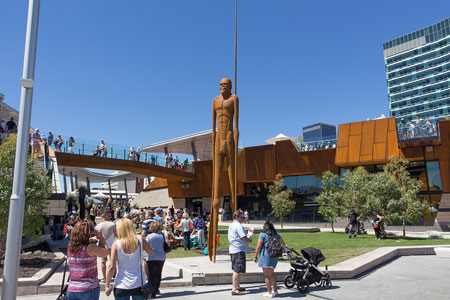City of Cockburn Hungarian Translation Services
Perth Translation Services » Perth » City of Cockburn Translation Services » City of Cockburn Hungarian Translation Service
City of Cockburn Hungarian Translation Services
Get fast and professional translation services in City of Cockburn. Our Hungarian translators provide translation of all types of documents. These include confidential legal, financial and migration document translations.
Upload Document For Translation

City of Cockburn
The City of Cockburn is a local government area in the southern suburbs of the Western Australian capital city of Perth about 8 kilometres (5 mi) south of Fremantle and about 24 kilometres (15 mi) south of Perth's central business district. The City covers an area of 167.5 square kilometres (64.7 sq mi) and had a population of over 104,000 as at the 2016 Census.
City of Cockburn History
Cockburn is named after Cockburn Sound, which was named in 1827 by Captain James Stirling after Admiral Sir George Cockburn. Sir George was born in London in 1772 and was a renowned British naval officer, eventually becoming Admiral of the Fleet and First Sea Lord. He served under Horatio Nelson during the war with France, but came to public attention and was granted his knighthood for his service in the War of 1812, in particular for the burning of Washington in 1814. It was he who took Napoleon to exile on the island of Saint Helena after the Battle of Waterloo in 1815.
In 1871, the Fremantle Road District was created under the District Roads Act 1871 to cover the area to the south and east of Fremantle, and the Fremantle Road Board was created to manage it. The original District was bounded on the north by the Swan River from Fremantle to the mouth of the Canning River; on the east by a line from Bull Creek to the junction of what is now the intersection of the Albany and South Western Highways in Armadale; on the south by a line from Armadale to, and including the Rockingham townsite; and to the west by the Indian Ocean.
City of Cockburn Suburbs
Atwell, Aubin Grove, Banjup, Beeliar, Bibra Lake, Cockburn Central, Coogee, Coolbellup, Hamilton Hill, Hammond Park, Henderson, Jandakot, Leeming, Munster, North Coogee, North Lake, Rottnest Island, South Lake, Spearwood, Success, Treeby, Wattleup, YangebupAbout the Hungarian Language
Hungarian is a Finno-Ugric language, which is a member of the Uralic language family. The group of Finno-Ugric languages also includes Finnish, Estonian, Lappic (Sámi) and some other languages spoken in the Russian Federation. Out of these it is Khanty and Mansi that are the most closely related to Hungarian. The Hungarian name for the language is magyar.
The traditional view holds that the Hungarian language diverged from its Ugric relatives in the first half of the 1st millennium BC, in western Siberia east of the southern Urals. The Hungarians gradually changed their lifestyle from being settled hunters to being nomadic pastoralists, probably as a result of early contacts with Iranian (Scythians and Sarmatians) or Turkic nomads. In Hungarian, Iranian loanwords date back to the time immediately following the breakup of Ugric and probably span well over a millennium. Among these include tehén ‘cow’ (cf. Avestan dhaénu); tíz ‘ten’ (cf. Avestan dasa); tej ‘milk’ (cf. Persian dáje ‘wet nurse’); and nád ‘reed’ (from late Middle Iranian; cf. Middle Persian nāy).
Archaeological evidence from present day southern Bashkortostan confirms the existence of Hungarian settlements between the Volga River and the Ural Mountains. The Onogurs (and Bulgars) later had a great influence on the language, especially between the 5th and 9th centuries. This layer of Turkic loans is large and varied (e.g. szó "word", from Turkic; and daru "crane", from the related Permic languages), and includes words borrowed from Oghur Turkic; e.g. borjú "calf" (cf. Chuvash păru, părăv vs. Turkish buzağı); dél ‘noon; south’ (cf. Chuvash tĕl vs. Turkish dial. düš). Many words related to agriculture, state administration and even family relationships show evidence of such backgrounds. Hungarian syntax and grammar were not influenced in a similarly dramatic way over these three centuries.
After the arrival of the Hungarians in the Carpathian Basin, the language came into contact with a variety of speech communities, among them Slavic, Turkic, and German. Turkic loans from this period come mainly from the Pechenegs and Cumanians, who settled in Hungary during the 12th and 13th centuries: e.g. koboz "cobza" (cf. Turkish kopuz ‘lute’); komondor "mop dog" (< *kumandur < Cuman). Hungarian borrowed many words from neighbouring Slavic languages: e.g. tégla ‘brick’; mák ‘poppy’; karácsony ‘Christmas’). These languages in turn borrowed words from Hungarian: e.g. Serbo-Croatian ašov from Hungarian ásó ‘spade’. About 1.6 percent of the Romanian lexicon is of Hungarian origin.
Recent studies support an origin of the Uralic languages, including early Hungarian, in eastern or central Siberia, somewhere between the Ob and Yenisei river or near the Sayan mountains in the Russian-Mongolian borderregion. A 2019 study based on genetics, archaeology and linguistics, found that early Uralic speakers arrived from the East, specific from eastern Siberia, to Europe. Today the language holds official status nationally in Hungary and regionally in Romania, Slovakia, Serbia, Austria and Slovenia.
City of Cockburn Hungarian Translator Services
Hungarian translator for certified translation services:
- Hungarian driving license translation
- Hungarian financial translation and bank statement translations
- Hungarian birth certificate translation
- Hungarian marriage certificate translation
- Hungarian name-change certificate translation
- Hungarian degree translation
- Hungarian diploma translation
- Hungarian school transcript translation
- Hungarian passport translation
- Hungarian police report translation
- Hungarian police check translation
- Hungarian personal letters and cards
- Hungarian utility bill translations
- Hungarian death certificate translation
Perth Translation provides fast and affordable Hungarian translation services in the City of Cockburn for all types of personal documents by NAATI translators.
Languages Translated
- Arabic translation service
- Czech translation service
- Chinese translation service
- Croatian translation service
- Danish translation service
- Dutch translation service
- French translation service
- Finnish translation service
- Greek translation service

